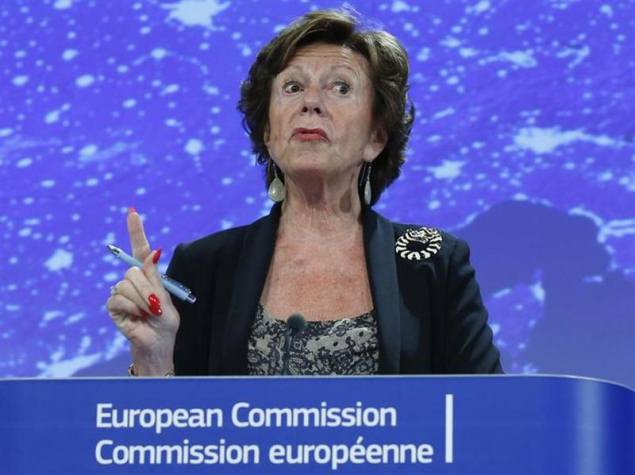- Home
- Internet
- Internet News
- EU votes to end roaming fees by 2016, protect net neutrality
EU votes to end roaming fees by 2016, protect net neutrality

In a sitting of the parliament in Brussels, lawmakers backed legislation that will phase out roaming fees across the 28-country European Union by December 2015.
"This vote is the EU delivering for citizens," said Neelie Kroes, the European commissioner for digital affairs and an ardent advocate for ending the charges.
"This is what the EU is all about - getting rid of barriers to make life easier and less expensive. We should know what we are buying, we should not be ripped-off, and we should have the opportunity to change our mind."
At the same time, the parliament voted in favour of maintaining "net neutrality", effectively declaring that all traffic on the Internet should be treated equally, regardless of the source or the content.
The decision is a move to limit the ability of network operators to provide quicker Internet access to content providers in exchange for a fee and is another decision in favour of consumers.
Both steps are part of Kroes's plans to overhaul Europe's telecoms sector and try to make it more competitive with rivals in the United States and Asia. But they also come just two months before EU elections, when more than 300 million Europeans will vote for candidates to the European Parliament.
Putting an end to mobile roaming - and the phone-bill shock that affects those who use their phones abroad - has been a banner issue for legislators over the past three years, leading to tense exchanges with the powerful telecoms industry.
Sector analysts estimate telecoms revenues could fall around five percent without roaming fees, although the Commission argues that since more consumers will use their mobiles as a result, some of the impact will be offset.
European lawmakers also set restrictions on the kind of online services that telecoms operators can charge popular, bandwidth-hungry content providers such as Facebook , Google and Netflix in exchange for delivering their services at faster speeds.
Operators are fighting for a share of the profits from video streaming and music downloads to offset declining revenues in their traditional phone services. Sales are forecast to fall for the fifth consecutive year in 2014.
The industry says charging for different services and speeds would would help fund network upgrades. But Internet activists say that goes against the spirit of an open Internet and would lead to the creation of a two-speed system.
The European Parliament's vote on Thursday effectively sides with consumers and Internet activists, backing "net neutrality".
Lobbying group ETNO, whose members include Deutsche Telekom , Orange , Telefonica and Telecoms Italia , said the parliamentary vote was a step in the wrong direction.
"Today's vote risks derailing the original objectives of the Connected Continent Regulation, namely a strong European digital industry igniting growth and jobs creation," ETNO head Luigi Gambardella said.
Following parliament's backing, the measures will become law after they are approved by the European Council, which represents the EU's member states. After further discussions, the Council is expected to take a decision in October.© Thomson Reuters 2014
For the latest tech news and reviews, follow Gadgets 360 on X, Facebook, WhatsApp, Threads and Google News. For the latest videos on gadgets and tech, subscribe to our YouTube channel. If you want to know everything about top influencers, follow our in-house Who'sThat360 on Instagram and YouTube.
Related Stories
- Samsung Galaxy Unpacked 2025
- ChatGPT
- Redmi Note 14 Pro+
- iPhone 16
- Apple Vision Pro
- Oneplus 12
- OnePlus Nord CE 3 Lite 5G
- iPhone 13
- Xiaomi 14 Pro
- Oppo Find N3
- Tecno Spark Go (2023)
- Realme V30
- Best Phones Under 25000
- Samsung Galaxy S24 Series
- Cryptocurrency
- iQoo 12
- Samsung Galaxy S24 Ultra
- Giottus
- Samsung Galaxy Z Flip 5
- Apple 'Scary Fast'
- Housefull 5
- GoPro Hero 12 Black Review
- Invincible Season 2
- JioGlass
- HD Ready TV
- Laptop Under 50000
- Smartwatch Under 10000
- Latest Mobile Phones
- Compare Phones
- Vivo Y300 GT
- Samsung Galaxy F56 5G
- Realme C75 5G
- Lava Yuva Star 2
- Vivo Y19 5G
- iQOO Z10 Turbo Pro
- iQOO Z10 Turbo
- CMF by Nothing Phone 2 Pro
- Microsoft Surface Pro 12-inch
- Microsoft Surface Laptop 13-inch
- Lenovo Legion Y700 4th Gen
- Honor Pad GT
- boAt Storm Infinity Plus
- Moto Watch Fit
- Xiaomi QLED TV FX Pro (55-inch)
- Xiaomi QLED TV FX Pro
- Asus ROG Ally
- Nintendo Switch Lite
- Toshiba 1.8 Ton 5 Star Inverter Split AC (RAS-24TKCV5G-INZ / RAS-24TACV5G-INZ)
- Toshiba 1.5 Ton 5 Star Inverter Split AC (RAS-18PKCV2G-IN / RAS-18PACV2G-IN)















